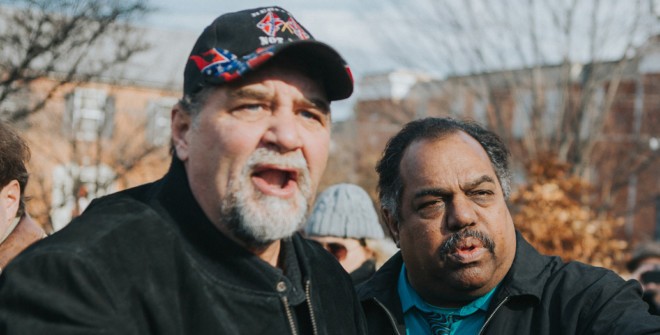Befriending the KKK: Documentary star to lecture on relieving racial tensions

GVL / Courtesy – c-ville.com
Feb 15, 2018
When one thinks of hate groups like the Ku Klux Klan (KKK), they often don’t think about being courteous.
Grand Valley State University’s Office of Multicultural Affairs (OMA) will host “Accidental Courtesy,” a lecture from Daryl Davis about relieving racial tensions, Tuesday, Feb. 20, from 1 p.m. to 2:30 p.m. in the Kirkhof Center Grand River Room.
Davis will discuss his experiences encountering leaders of the KKK to demonstrate the importance of building relationships in a society that is gradually becoming more diverse.
Davis is the star and author of the documentary “Accidental Courtesy: Daryl Davis, Race & America” directed by Matthew Ornstein, which was released on Netflix in 2016. This social and cultural documentary follows the story of Davis, an African-American musician with the goal of changing racist mindsets.
In the documentary, Davis meets and befriends some members of the KKK, hoping to broaden their points of view toward the black community. Eventually, he manages to talk to some of the members and make them reconsider their beliefs. There are members who end up leaving the Klan and turn to support Davis by giving him their white robes, the renowned uniform of the extremist movement. Davis keeps their robes and hoods to build a collection of stories and people to hopefully build a museum of the Klan.
“It’s about how he interacts with members of the KKK and his experience working with people who don’t agree with who he stands for as a person,” said Britney Underwood, a graduate assistant in the OMA. “Students will learn his journey and the reason as to why he started to do this. The most important component here is that he’s able to interact with these members and make them denounce their membership to the KKK after befriending him.”
Underwood and members of the OMA hope that bringing Davis to GVSU will serve as an opportunity for students to gain a new perspective.
“This gives students an outlet to explore a different avenue of having a conversation with people who may or may not agree with them,” she said. “That’s the reason why we decided to bring Davis to the campus. I’d personally like students to take away the different perspective that Daryl offers.
“In this time of social media and racial discrimination, it’s very easy to walk away from this. From the outside looking in, it may look like he’s trying to get to the ‘other side,’ but what he truly offers is another perspective to tackling racial discrimination in a way that many may not see.”
Davis’ method could serve as a new way of approaching difficulties for those who attend.
“If he’s able to talk to members of a hate group against other races such as the KKK, here (at) GVSU we hope that people may learn how to talk with people with whom they disagree,” Underwood said.
In an op-ed for The Washington Post, Davis authored his perspectives on being able to overcome racial tensions.
“How can anybody hate me when you don’t even know me?” he wrote.
Davis poses this question as a way to make people open their minds to conversation. He strongly believes that conversation can relieve tension. His aim is not to convert people and change their points of view as “hateful, violent racists.” All he asks for is a conversation for understanding.
“I’ve seen firsthand that when two enemies are talking, they are not fighting,” he wrote. “They may be yelling and beating their fists on the table, but at least they are talking. Violence happens only when talking has stopped.”
Davis’ documentary, which won several film festival awards in 2016, will be screened in the OMA office (Kirkhof Center, Room 1240) on Friday, Feb. 16, at noon. His lecture is LIB 100- and 201-approved.

























